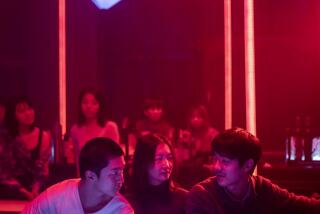MOVIE REVIEW : ‘China Cry’: An Inspirational Epic
- Share via
“China Cry” (selected theaters), the first theatrical production from the Trinity Broadcasting Network, a Christian organization, is a stirring, large-scale epic--and a romantic love story as well--based on San Jose evangelist Nora Lam’s early life and long ordeal as a Christian in Communist China.
In style and tone it’s old-fashioned, melodramatic and occasionally ponderous, but it is also marked by the solid craftsmanship, unmistakable commitment and genuine spirituality typical of the work of its capable writer-director James F. Collier, long associated with Billy Graham’s now-defunct World Wide Pictures.
“China Cry” is inspirational in the best sense of the word, and it is sustained by an exceptional, far-ranging performance by Julia Nickson-Soul as Lam and an equally fine supporting cast.
The film opens in Shanghai in 1941 just as the Japanese invade the city where Lam, then 9, has been raised in luxury as a spoiled princess by her wealthy physician father (James Shigeta) and her beautiful, aristocratic mother (France Nuyen). The pride and forthrightness instilled in Lam will trigger her persecution after she is graduated from Soochow University and begins teaching. Among other “sins,” Lam is accused of being a Christian because as a child she had attended a school run by Presbyterians. As her ordeal continues, Lam discovers that she really is the believer in Christ she never considered herself to be.
“China Cry” unfolds much like Collier’s outstanding 1975 “The Hiding Place,” about a Dutch woman who ended up in Ravensbruck for having sheltered Jews and who, like Lam, considered her survival a miracle from God.
“China Cry” (rated PG-13) is similarly persuasive both in its depiction of the harshness of its heroine’s ordeal and the sincerity of her beliefs. There are numerous telling touches, such as a group of underground Christians joyfully mouthing hymns they dare not sing aloud.
Nickson-Soul’s Lam clearly comes deeply from within and Russell Wong, the harried young husband of Wayne Wang’s “Eat a Bowl of Soup,” is just right as Lam’s supportive, equally proud husband, an attorney with a rich family in Hong Kong.
Shigeta and Nuyen are outstanding as Lam’s parents, gallant in the face of injustice, hardship and cruelty. Phillip Tan is rightly hissable as Lam’s chief inquisitor, a Red Army colonel.
Collier, cinematographer David Worth and production designer Norman Baron deserve credit for so effectively passing off locales in Hong Kong and Macao as various settings in China during the tumultuous years of the ‘40s and ‘50s. Al Kasha and Joel Hirschhorn have provided a stormy, all-stops-out score, suitably emotional but also a key contributor to making the film seem old-fashioned.
More to Read
Only good movies
Get the Indie Focus newsletter, Mark Olsen's weekly guide to the world of cinema.
You may occasionally receive promotional content from the Los Angeles Times.







